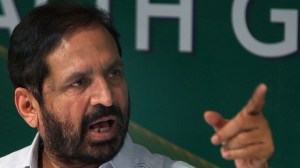The league of hipster statesmen
A politician is a man who understands government. A statesman is a politician who8217;s been dead for 15 years.

A second act is rare in world politics. History can point to a handful of leaders who managed to reacquire political power after losing it Napoleon, Churchill, Deng Xiaoping, Alan Garcia. Traditionally, however, when a politician loses his job, he faces the purgatory of being a statesman. At best, he makes money and becomes the titular head of an international organisation. At worst, he gets shot.
Al Gore8217;s Nobel Peace Prize, however, highlights a newer and more intriguing possibility for this generation8217;s crop of statesmen: the ex-politician as policy entrepreneur 8212; a hipster statesman. As a politician, Gore was a noble failure; his most signal accomplishment was to help negotiate a global warming treaty that had zero chance of ratification in his home country. As a statesman, Gore has become a rock star. In the past year, in addition to his Nobel, he has won an Emmy and his movie won an Oscar, thereby guaranteeing himself the World8217;s Most Awesome Mantle. His documentary An Inconvenient Truth has shifted the debate on global warming in the US. He was the chief promoter of this past summer8217;s Live Earth concerts. As an environmentalist, Gore is more relevant now than when he was vice president.
Gore is the most prominent hipster statesman, but he is hardly the only one. Last week former president of Mozambique Joaquim Chissano won the inaugural Mo Ibrahim Prize for Achievement in African Leadership. The prize rewards politicians for becoming statesmen 8212; that is, gracefully leaving office when their constitutional term of office expires. Tony Blair has moved from 10 Downing Street to the slightly more dangerous address of the Middle East, as the envoy for the Quartet the US, UN, European Union and Russia.
Even rock stars are yearning to mingle with statesmen. Over the summer, singer Peter Gabriel cosponsored the formation of a group called 8216;The Elders.8217; According to their Web site, The Elders will, 8220;use their unique collective skills to catalyse peaceful resolutions to long-standing conflicts 8230; and share wisdom by helping to connect voices all over the world.8221; The Elders8217; roster is like a Hall of Fame for hipster statesmen, including former presidents Jimmy Carter, Mary Robinson, Fernando Cardoso and Nelson Mandela.
But there are two very powerful constraints on ability of the hipster statesmen to get anything done. First, the policy-entrepreneur approach cannot work on all policy problems. To update Truman8217;s aphorism for the 21st century, when you are a statesman, you can choose your issues; when you are a politician, the issues choose you. Real politicians do not always respond to the pleas of statesmen, because they are busy avoiding the fate of becoming a statesman. Wealth, popularity and glamour might be enticing, but as Henry Kissinger once observed, power is the ultimate aphrodisiac.
Second, calling attention to a problem is not the same thing as solving it. The assumption underlying the hipster statesmen is that once people become aware of a problem, there will be a groundswell of support for direct action 8212; what Gore labeled 8220;an opportunity to lift global consciousness to a higher level8221; after winning the Nobel. This is not how politics usually works, particularly in the international realm. Any solution to a problem like global warming, for example, involves significant costs 8212; and the distribution of those costs is a contentious issue. Even if more people become aware of a policy problem, it is far from guaranteed that a consensus or compromise will emerge about the best way to solve it.
- 01
- 02
- 03
- 04
- 05































